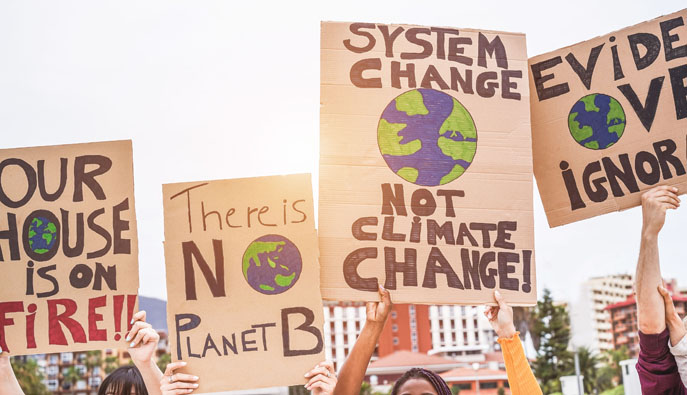COMMENT: Richard Roberts of Volans argues that deep and fundamental transformation will be needed to avert climate catastrophe
Who’s afraid of net-zero? Judging by their words, not the world’s largest financial institutions. Last week the Net Zero Asset Managers Initiative announced that it has tripled in size since its launch in December, and now represents another $32tn of assets under management, 36% of the global total.
The new signatories include the two biggest asset managers in the world, BlackRock and Vanguard. The six largest US banks have all committed to achieving net-zero financed emissions by 2050 – as have Barclays, HSBC, NatWest and others. With just over six months to go until COP26, the campaign to get financial institutions on board with the goal of net-zero could scarcely be going any better.
Except it isn’t quite that simple, of course. Aspirations are all well and good, but how many of these investors and banks have truly understood what the transition to net-zero means for them and the global financial system they are part of? I suspect the answer is not many.
The inconvenient truth is that keeping global warming to under 1.5C is likely to involve considerable destruction of financial value
Collectively, the financial industry is still treating climate change like it’s an incremental challenge, when in fact it requires deep and fundamental transformation. In a recent paper, Innovation and Transformation: What it will take to Finance Net Zero, co-authored with my Volans colleague John Elkington as part of a series commissioned by UNEP FI and Climate-KIC, we argue that a major shift in the purpose and practice of finance – as well as the policies that determine the “rules of the game” – is needed to avert climate catastrophe.
The inconvenient truth is that keeping global warming to under 1.5C is likely to involve considerable destruction of financial value – not nearly as much value-destruction as we would see in a 4C future, but significant value destruction nonetheless. In part, this is because so-called “externalities”, including the vast majority of greenhouse gas emissions, are inadequately priced today. The transition to net-zero will require many of these externalities to be internalised, which will eat into cash flows and asset valuations.
Value-destruction is also an essential part of disruptive innovation. As whole sectors are upended over the decades ahead, new value will be created, but much incumbent value will be destroyed, and there is no guarantee that the former will outweigh the latter. In fact, if we take the IPCC’s guidance seriously, it becomes all but impossible for growth in aggregate financial value to continue unabated. Decoupling growth from energy demand and carbon emissions may be achievable eventually – but not on a timescale that is relevant for a 1.5C world.

All of this makes it extremely difficult to imagine a future in which what’s good for risk-adjusted returns and what’s good for the planet converge fast enough for us to avoid the need for profound, often uncomfortable, changes to the way finance operates. This is where our transformative agenda for finance comes in – a prescription for aligning finance to the reality of a net-zero future that encompasses three levels: purpose, practice and policy.
Transforming purpose – Today’s financial industry operates largely on the assumption that the best – indeed only – way to serve clients’ and beneficiaries’ interests is to maximise financial returns, irrespective of the non-financial outcomes generated in the process. This assumption is increasingly indefensible, particularly in relation to climate change, which does materially impact clients’ and beneficiaries’ wellbeing and quality of life – now and in the future.
We therefore need to rethink the fiduciary duties that financial intermediaries owe to their clients and beneficiaries – moving away from the narrow definition that has prevailed over the last 50 years towards a new definition that incorporates their non-financial preferences and interests. This is something that investors and policymakers should expect to hear more about in the near future, when the PRI and UNEP FI publish their work on “a legal framework for impact”.
To align finance to a net-zero economy, policymakers must play a market-shaping role
Transforming practice – Translating this redefinition of the purpose of finance into practice will involve several dimensions: a renewed focus on the concept of stewardship; a shift in focus from individual assets to whole systems; and a collaborative approach to de-risking the investments needed to put our economies on the path to net-zero in time.
First, stewardship. At present, relatively few financial firms are actively engaging with corporate management teams on climate issues – and those that do mostly limit their engagement to a relatively narrow set of issues related to risk and disclosure. But if the financial industry is to serve the best interests of its end beneficiaries, it will need to become much more active – activist, even – in using its influence on management teams to push for credible, robust net-zero transition plans.
Second, systemic investing. This emergent field of practice is based on the recognition that the net-zero transition is about transforming whole systems, not simply optimising asset-level outcomes. Systemic investors seek to identify companies and investments that have the potential to catalyse systems-level changes and then build portfolios that unlock synergies and combinatorial effects, so that the whole of a portfolio’s real-world impact is greater than the sum of its parts.
Third, collaborative de-risking. Many of the investments required for a rapid transition are either too high-risk or too low-return for mainstream investors. In this context, collaborative models for risk- and reward-sharing become critical in order to activate diverse pools of both public and private capital, and get to the scale of investment needed. The basic idea of creating financial mechanisms that can tap on different sources of capital and which are structured to include separate layers of risk and return is not new, but it now needs to be applied at scale to climate finance.

Transforming policy – Finance is undoubtedly a powerful lever but it is not the only one we need. To align finance to a net-zero economy, policymakers must play a market-shaping role.
On its own, finance cannot change the underlying profitability (or otherwise) of business models. Ultimately, it’s up to governments to enact and enforce rules that ensure profits reflect value to society. Carbon taxes – and the elimination of fossil fuel subsidies – are one obvious part of the solution.
Very few of the investors and banks trumpeting their net-zero aspirations today seem to have grasped the sheer enormity of what getting to net-zero will require of them and their peers. Our analysis indicates that, at a global level (the level that really counts when it comes to climate change), Paris alignment cannot be achieved through the traditional lenses of financial risk and return alone. Therefore, a paradigm shift is necessary.
Optimising climate outcomes must become one of the financial system’s core functions – baked into both private and public institutions’ mandates. The longer we pretend that an incremental greening of finance-as-usual will be sufficient to get to net-zero, the more painful and destabilising the necessary adjustments will be when they come. The sooner we face up to the inconvenient truths about what net-zero means for the financial system the better.

Richard Roberts is Inquiry Lead at Volans, a research and advisory firm focused on sustainability, innovation and market transformation.

